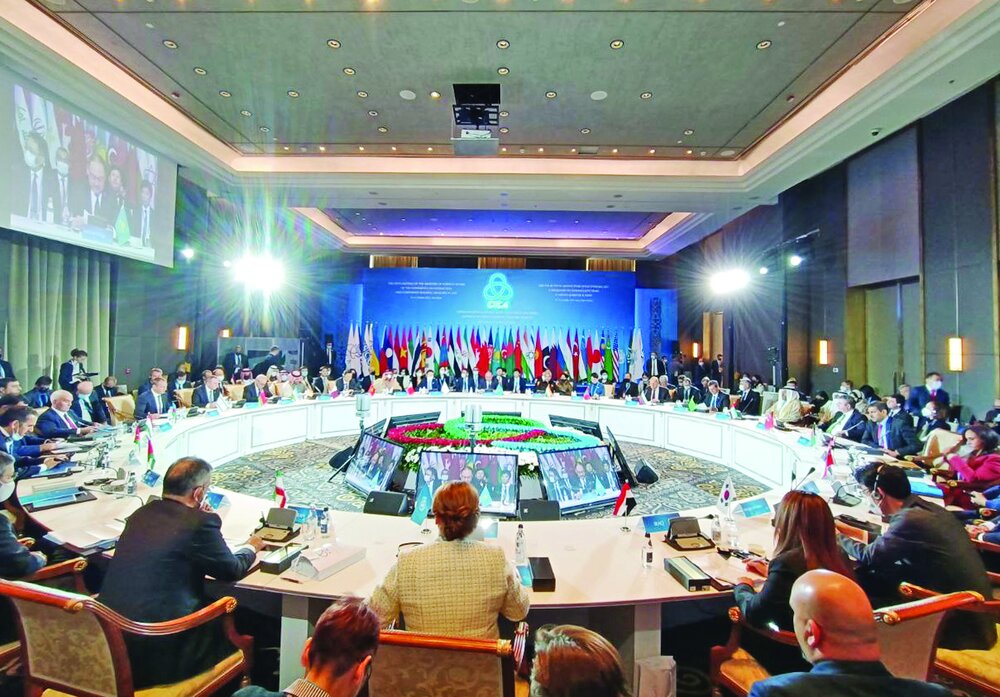CICA: an initiative to change equations

NUR-SULTAN, Kazakhstan — As the 6th ministerial meeting of the CICA (Conference on Interaction and Confidence Building Measures in Asia) kicked off on Monday in Nur-Sultan, the ministers emphasized the need for stronger multilateralism amid the increased challenges, including the pandemic and the destabilizing situation in Afghanistan.
The one-day event in the Kazakh capital gathered representatives of 23 out of 27 member states and observers, heads of international observer organizations, and partner organizations in a hybrid format.
Founded by Kazakhstan’s First President Nursultan Nazarbayev in 1992, CICA is aimed at the political rapprochement of countries and the creation of a common and inclusive space for security and stability in Asia. CICA unites 27 states, nearly half of the world’s population and more than half of the world’s GDP.
“Seeking solutions to the most acute problems of the continent requires a multilateral approach and cooperation,” wrote Nazarbayev in his address, read out by Acting Foreign Minister of Kazakhstan Akan Rakhmetullin.
“Today, we need constructive interaction to achieve sustainable and indigenous security,” Iranian diplomat says.
Amid the growing global dominance and cold war narratives, CICA remains an “important global political center” promoting the principles of “partnership, equality and mutual solidarity.”
Rakhmetullin, in his opening remarks, also noted the significance of the region in terms of economic and human potential. “What remains unchanged is that Asia is our common home, and it is our responsibility to address acute issues. There are still zones of instability, nuclear non-proliferation, terrorism and extremism risks,” he said.
Iranian delegation at the conference is headed by Alireza Haghighian, Director General of the Eurasia Department of the Foreign Ministry.
Iran says considers heinous crimes in Palestine as child of “normalization” process
In his speech, he thanked the government and people of Kazakhstan for their warm hospitality.
“Today, the world is in a parallel situation,” the diplomat noted.
He also underscored that the COVID-19 pandemic has severely affected regional cooperation. He then went on to emphasize the importance of unity among the CICA members to overcome such challenges.
The pursuit of unilateral security by relying on military power has long since ended, Haghighian said.
He also said that “trans-regional interventionist powers” who seek to create insecurity and threaten to disrupt the security of others to achieve their “illusionary security” are well-versed in the cases of Iraq, Syria, Yemen, and Afghanistan.
He added that security and development are the two sides of the same coin.
Iran considers Asia as the driving force in its foreign policy and economic interactions.
“Today, we need constructive interaction to achieve sustainable and indigenous security,” Haghighian said.
He added that Iran considers Asia as the driving force in its foreign policy and economic interactions.
According to the diplomat, Iran adheres to its policy of strengthening good neighborliness, building trust, and opening the door for other Asian countries.
The diplomat reminded the CICA members that Iran has proposed several peace initiatives to help solve the regional crises.
“Iran is working closely with countries in the region to remove problems such as terrorism, and to emphasize the need to increase continued multilateral cooperation among the CICA member states are the manifestation of the Islamic Republic of Iran’s constant commitment to play a participatory and cooperative role in ensuring security and sustainable development in the region and the world,” he added.
Haghighian also said that Iran has always considered the security and stability of its neighbors as its own.
“We believe the issues between neighbors should be resolved through dialogue and political solution,” the diplomat underlined.
He noted that in this regard, any alliance or unity with third parties especially entities with a grim record of aggression, assassination, espionage, conspiracy, war crimes, and crimes against humanity will result in nothing but losses for the perpetrators of such alliances.
“The blind support for apartheid in the occupied Palestinian territories and the denial of basic rights of the Palestinian people exacerbate throughout the Middle East,” Haghighian lamented.
He blamed countries for being silent over the massacre of the Palestinian children and the escalation of the crimes of the occupying regime in Palestine, saying that these heinous crimes are one of the consequences of the so-called “normalization” process, which few countries joined.
“Iran in strongest possible way condemns the escalations in the occupied Palestinian territory, including the holy Quds, as a blatant, systematic violation of human rights, and humanitarian laws,” the diplomat remarked.
He then concluded by saying that CICA has a very important place in the foreign policy chart of Iran, adding that the coronavirus pandemic, climate change, cyber-attacks, and so on, require a “fundamental overhaul” of security priorities.
CICA is an intergovernmental forum aimed at strengthening regional cooperation and ensuring peace, security, and stability in Asia. The idea of creating the organization was first voiced by Kazakhstan’s First President Nursultan Nazarbayev in 1992 at the 47th session of the United Nations General Assembly, while the first CICA summit was held in June of 2002. CICA members include 27 Asian countries, including Azerbaijan, Bahrain, China, Egypt, India, Iran, Israel, Russia, South Korea, and Turkey, nine observer states, and five international organizations, according to Astana Times.
The establishment of the CICA forum emerged from the firm belief that international progress can come about only through strong and effective partnerships. Since the first ministerial meeting, which took place in 1999, CICA has strived to enhance cooperation through elaborating multilateral approaches towards promoting peace, security and stability in Asia.
Yet the world has changed dramatically in the past two decades. Asia has become a key driver of global economic growth and development. Multi-polarity has become the norm of international relations. Countries are actively cooperating thanks to globalization, yet at the same time nationalism is on the rise in many parts of the world. To adapt to these changes, the CICA forum must transform in order to continue to fulfill its important role.
Leave a Comment